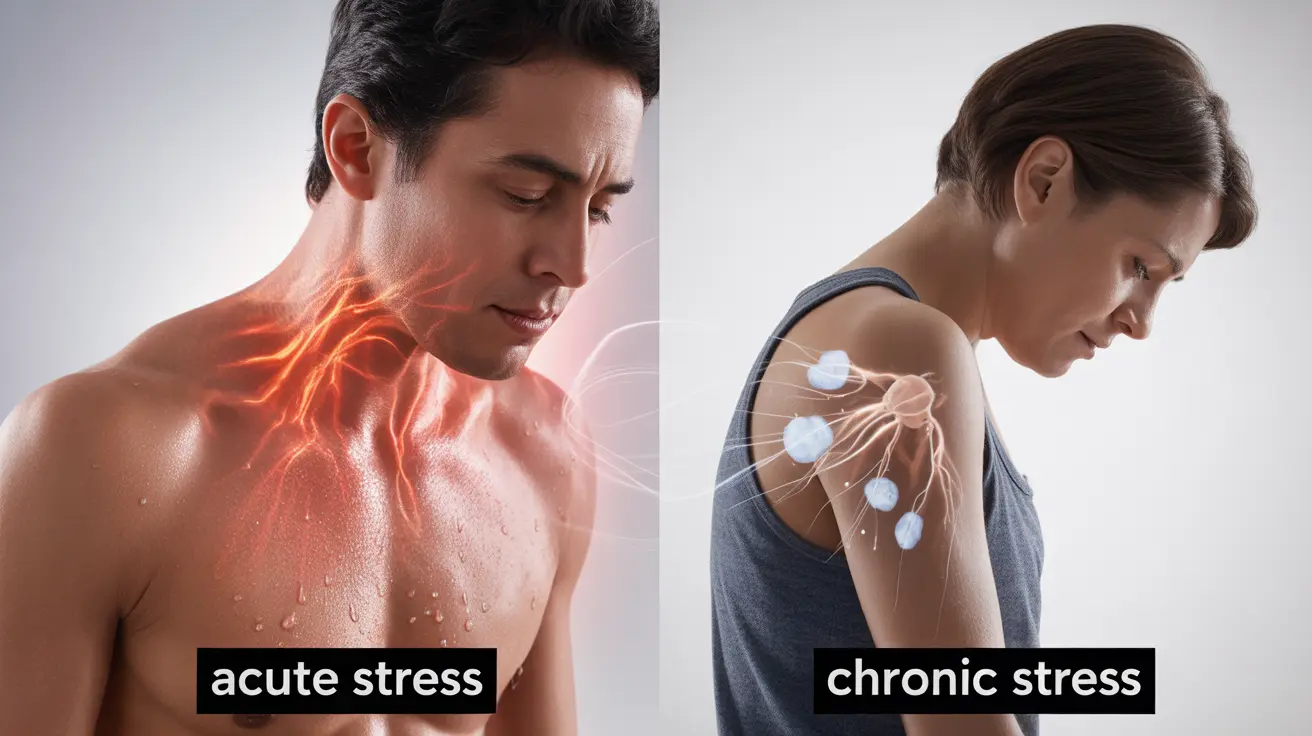Everyone experiences stress, but not all stress is created equal. Understanding the distinction between acute and chronic stress is crucial for recognizing how these different types of stress affect our bodies and minds, and more importantly, how to manage them effectively.
In this comprehensive guide, we'll explore the fundamental differences between acute and chronic stress, their unique characteristics, and evidence-based strategies for managing each type.
The Nature of Acute vs Chronic Stress
Acute stress is your body's immediate reaction to a perceived threat or challenge. It triggers the "fight-or-flight" response, preparing you to handle immediate dangers or pressures. This type of stress is typically short-lived and resolves once the triggering situation passes.
Chronic stress, on the other hand, develops when you experience persistent pressure or negative circumstances over an extended period. This ongoing activation of your stress response system can lead to serious health complications if left unaddressed.
Identifying Stress Types Through Symptoms
Acute Stress Symptoms
Acute stress typically manifests through immediate physical and emotional responses:
- Rapid heartbeat
- Sweating
- Quick breathing
- Heightened alertness
- Muscle tension
- Temporary anxiety
- Increased focus
Chronic Stress Symptoms
Chronic stress presents more persistent and potentially severe symptoms:
- Ongoing fatigue
- Sleep disturbances
- Digestive problems
- Frequent headaches
- Persistent anxiety or depression
- Memory and concentration issues
- Weakened immune system
Common Triggers and Causes
Acute Stress Triggers
Acute stress typically results from immediate challenges or threats:
- Public speaking events
- Work deadlines
- Near-miss traffic incidents
- Arguments or confrontations
- Emergency situations
Chronic Stress Triggers
Chronic stress often stems from ongoing life circumstances:
- Financial difficulties
- Toxic relationships
- Demanding job conditions
- Chronic illness
- Ongoing caregiving responsibilities
Health Impact Assessment
Physical Health Effects
While acute stress typically causes temporary physical changes that resolve quickly, chronic stress can lead to lasting health issues such as cardiovascular problems, digestive disorders, and compromised immunity. The persistent nature of chronic stress means these effects accumulate over time, potentially causing serious health complications.
Mental Health Impact
Acute stress may temporarily affect mood and focus but generally doesn't cause lasting psychological damage. However, chronic stress can contribute to the development of mental health conditions including anxiety disorders, depression, and cognitive difficulties.
Management Strategies
Managing Acute Stress
For acute stress, immediate relief techniques are most effective:
- Deep breathing exercises
- Progressive muscle relaxation
- Brief meditation
- Physical activity
- Positive self-talk
Managing Chronic Stress
Chronic stress requires a more comprehensive, long-term approach:
- Regular exercise routine
- Consistent sleep schedule
- Professional counseling
- Stress management training
- Lifestyle modifications
- Social support system development
Frequently Asked Questions
- What are the main differences between acute and chronic stress?
Acute stress is short-term and typically resolves quickly, while chronic stress persists over extended periods. Acute stress helps you respond to immediate challenges, while chronic stress can lead to serious health problems due to prolonged activation of the stress response system.
- What symptoms should I look for to tell if I am experiencing acute or chronic stress?
Acute stress symptoms include immediate reactions like rapid heartbeat, sweating, and temporary anxiety. Chronic stress symptoms are more persistent, including ongoing fatigue, sleep problems, digestive issues, and constant worry or anxiety.
- What are common causes of acute stress compared to chronic stress?
Acute stress is typically triggered by immediate events like public speaking or deadlines, while chronic stress often results from ongoing situations like financial problems, difficult relationships, or persistent work pressure.
- How does chronic stress affect physical and mental health differently than acute stress?
Acute stress causes temporary physiological changes that typically resolve quickly. Chronic stress, however, can lead to lasting health problems including cardiovascular issues, weakened immunity, anxiety disorders, and depression.
- What are effective ways to manage or treat acute stress versus chronic stress?
Acute stress responds well to immediate relief techniques like deep breathing and brief meditation. Chronic stress requires a more comprehensive approach including regular exercise, professional support, lifestyle changes, and developing strong social support systems.




